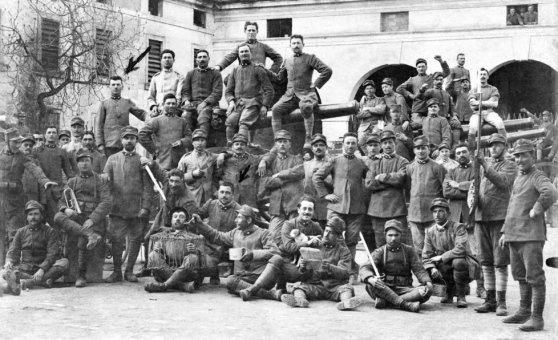
Period 1511-1526, for 15 years, the archipelago became an important maritime port for the Kingdom of Portugal, which regularly became a maritime route to Sumatra, Java, Banda and Maluku.
In 1511 the Portuguese defeated the Kingdom of Malacca.
In 1512 the Portuguese established communications with the Kingdom of Sunda to sign trade agreements, notably pepper. The trade agreement was then realized on 21 August 1522 in the form of a duplicate contract document, one copy for the king of Sunda and another for the king of Portugal. On the same day built an inscription called Inscription of the Sunda-Portugal Covenant at a place which is currently the corner of Jalan Cengkeh and Jalan Kali Besar Timur I, West Jakarta. With this agreement the Portuguese are allowed to build a warehouse or fortress in Sunda Kelapa.
In 1512 Afonso de Albuquerque also sent Antonio Albreu and Franscisco Serrao to lead his fleet in search of a path to the origin of spices in Maluku. Along the way, they stopped in Madura, Bali, and Lombok. Using the Javanese skippers, the fleet arrived at the Banda Islands, heading for North Maluku until he reached Ternate.
The presence of Portuguese in Indonesian waters and islands has left traces of history to this day still retained by local communities in the archipelago, especially Flores, Solor and Maluku, in Jakarta Kampong Tugu located in the north of Jakarta, between Kali Cakung, Cilincing beach and Marunda's land.
The first European to discover Maluku was Portuguese, in 1512. At that time two Portuguese fleets, each under the leadership of Anthony d'Abreu and Francisco Serau, landed on the Banda Islands and Turtle Islands. After they established friendships with local residents and kings - as with the Ternate Kingdom on the island of Ternate, the Portuguese were given permission to erect fortresses in Pikaoli, as well as the old Hitu Land, and Mamala on Ambon Island.But this spice trade relationship did not last long , because the Portuguese applied the monopoly system as well as the spread of Christianity.
One of the most famous missionaries was Francis Xavier. Arrived in Ambon on 14 February 1546, then traveled to Ternate, arriving in 1547, and relentlessly visited the islands of the Maluku Islands to spread the religion. The Portuguese and Ternate friendship ended in 1570. Battle with Sultan Babullah for 5 years (1570-1575), left the Portuguese to withdraw from Ternate and drive to Tidore and Ambon.
The Maluku people's resistance against the Portuguese, the Dutch used to set foot in Maluku. In 1605, the Dutch managed to force the Portuguese to surrender its defense in Ambon to Steven van der Hagen and in Tidore to Cornelisz Sebastiansz. Similarly, the British fortress at Kambelo, Seram Island, was destroyed by the Dutch. Since then the Dutch managed to control most of the Maluku region.
The Dutch position in Maluku grew stronger with the establishment of the VOC in 1602, and from that time the Dutch became the sole ruler of Maluku. Under the leadership of Jan Pieterszoon Coen, the VOC's Chief Operating Officer, the clove trade in Maluku slipped under the control of the VOC for almost 350 years. For this purpose the VOC does not hesitate to expel its competitors; Portuguese, Spanish, and English. Even tens of thousands of Moluccans became victims of VOC brutality.
then they built a fortress in Ternate in 1511, then in 1512 built the Citadel in Amurang North Sulawesi. The Portuguese lost the war with Spain then the area of North Sulawesi was surrendered in Spanish power (1560 to 1660). The Portuguese kingdom was later united with the Kingdom of Spain. (Read the book: Portuguese Colonial History in Indonesia, by David DS Lumoindong). The seventeenth century came the VOC (Dutch) trade fleet which later succeeded in expelling the Portuguese from Ternate, so that the Portuguese withdrew and controlled East Timor (since 1515).
Colonialism and Imperialism began to spread in Indonesia around the fifteenth century, beginning with the Portuguese landing in Malacca and the Dutch led by Cornellis de Houtman in 1596, to search for sources of spices and trade.
Hi! I am a robot. I just upvoted you! I found similar content that readers might be interested in:
http://hinmaftu.blogspot.com/
Lain kali kasih sumbernya yah😉
Congratulations @kompassejarah! You received a personal award!
You can view your badges on your Steem Board and compare to others on the Steem Ranking
Vote for @Steemitboard as a witness to get one more award and increased upvotes!